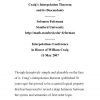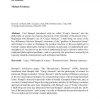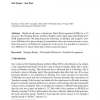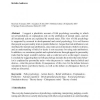SYNTHESE
2008
15 years 16 days ago
2008
SYNTHESE
2008
15 years 16 days ago
2008
g Interpolation Theorem in abstract model theory Jouko V
SYNTHESE
2008
15 years 16 days ago
2008
84
Voted
SYNTHESE
2008
15 years 16 days ago
2008
Hitchcock advances a diachronic Dutch Book argument (DDB) for a 1/3 answer to the Sleeping Beauty problem. Bradley and Leitgeb argue that Hitchcock's DDB argument fails. We de...
69
Voted
SYNTHESE
2008
15 years 16 days ago
2008
102
Voted
SYNTHESE
2008
15 years 16 days ago
2008
The present paper offers some remarks on the significance of first order model theory for our understanding of theories, and more generally, for our understanding of the "stru...
123
click to vote
SYNTHESE
2008
15 years 16 days ago
2008
Dynamic Epistemic Logic (DEL) is the study of how to reason about knowledge, belief, and communication. This paper studies the relative expressivity of certain fragments of the DE...
96
Voted
SYNTHESE
2008
15 years 16 days ago
2008
Abstract In ethical discourse, it is common practice to distinguish between normative commitments and descriptive commitments. Normative commitments reflect what a person ought to ...
101
Voted
SYNTHESE
2008
15 years 16 days ago
2008
I suggest a pluralistic account of folk psychology according to which not all predictions or explanations rely on the attribution of mental states, and not all intentional actions ...
100
Voted
SYNTHESE
2008
15 years 16 days ago
2008
ABSTRACT. In this paper, illocutionary acts of commanding will be differentiated from perlocutionary acts that affect preferences of addressees in a new dynamic logic which combine...




